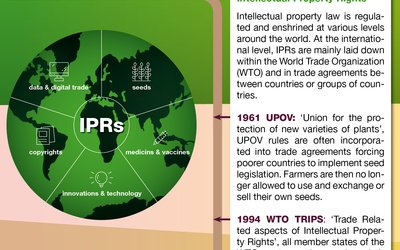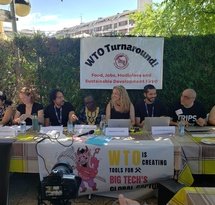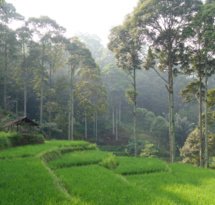
Intellectual property law is regulated at various levels around the world. At the international level, intellectual property rights are mainly laid down within the World Trade Organization (WTO) and in trade agreements. But what does this in practice mean for us? With this infographic, we've visualized what happens when a holder of intellectual property rights - usually a big company - thinks his rights are being violated.

This week, Geneva will be the epicenter of world trade, as trade ministers and other representatives from around the world gather for the World Trade Organization (WTO) ministerial conference. Liesje Schreinemacher, the Dutch Minister of Foreign Trade and Development Cooperation, is present with a delegation. Our colleague Burghard Ilge is joining as an official member of the delegation, to represent civil society organisations. Colleague Fernando Hernandez will also travel to Geneva, to follow and try to influence the negotiations from outside the conference room together with other civil society organisations from around the world.

Joint CSO call to all WTO Trade Ministers to not accept the current draft of Ministerial Decision on the TRIPS Agreement and demand a real Waiver

It sounds so logical: patents and other intellectual property rights protect investments in innovations, allowing more innovations to be made from which the whole world can benefit. Such as new medicines or drought-resistant crops. But in practice, these property rights often have the opposite effect, hindering access to innovations for those who need them the most.

The European Union (EU) continues to demand that countries of the South introduce plant variety protection rights according to UPOV 91 in free trade agreements. This is happening in the ongoing negotiations of the EU with Indonesia, trying to take away Indonesia's flexibility to implement a law that suits its own needs and priorities. We therefore call to sign our letters on this subject to the European Commission and the Indonesian government.

Pharmaceuticals hold on to their patents and (our) governments do not remove the barriers to free production that were raised under international trade agreements years ago.

The European Union's (EU) foreign trade policy has many implications for the sustainability of food systems in developing countries, heavily impacting farmers, breeders, and citizens. The unhidden promotion by the EU of strong intellectual property rights on plants affects food systems from its very basis, i.e., the seeds that are available for farmers to grow. Amongst these intellectual property rights, the main instrument that is advocated by European authorities is the 1991 Act of the UPOV Convention, which provides exclusive rights to breeders over the propagating material of new plant varieties, while diminishing the rights of others to use the material for further breeding and hampering with the rights of farmers to freely save, use, exchange and sell their seeds.